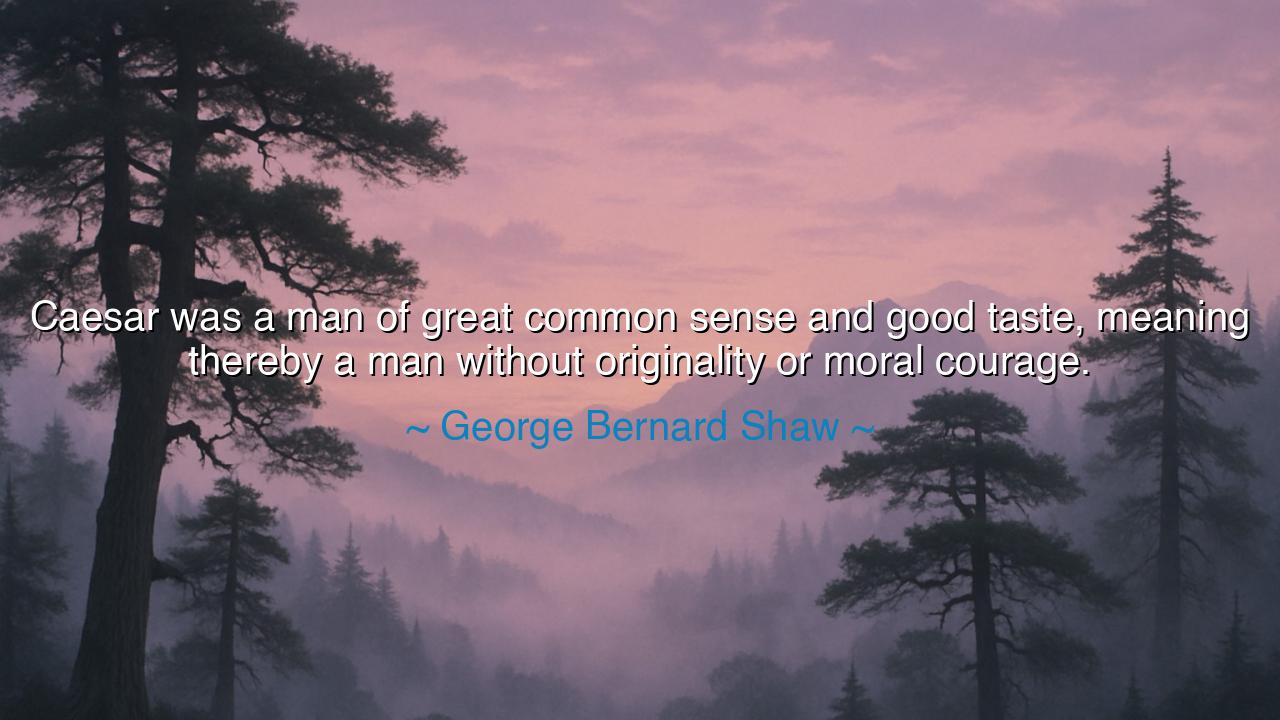
Caesar was a man of great common sense and good taste, meaning
Caesar was a man of great common sense and good taste, meaning thereby a man without originality or moral courage.






“Caesar was a man of great common sense and good taste, meaning thereby a man without originality or moral courage.” Thus wrote George Bernard Shaw, the firebrand playwright and philosopher, whose tongue was both sword and mirror — sharp enough to wound pretension, yet polished enough to reveal truth. In these words, he offers not merely a critique of Caesar, but of the human tendency to confuse prudence with greatness, and respectability with virtue. Common sense and good taste, those safe and celebrated qualities, are often the shackles of the soul. For Shaw saw that true greatness — true genius — is never born from safety, but from the courage to defy it.
The meaning of this quote is a paradox, both fierce and luminous. Shaw mocks the comfort of moderation, the false nobility of conformity. The one who clings to common sense may avoid folly, yes — but he also avoids discovery. The one who worships good taste may never offend, but neither will he inspire. Originality demands rebellion; moral courage demands risk. Thus, in Shaw’s judgment, Caesar — though wise in worldly matters and skilled in rule — lacked that divine spark that dares to stand alone against the approval of the many. His was the greatness of empire, not of spirit; the triumph of order, not of revelation.
To understand the origin of Shaw’s words, one must know his nature. He was a man who worshiped no authority and feared no reputation. He admired not the conqueror of lands but the conqueror of ideas. To Shaw, Julius Caesar symbolized the perfection of worldly wisdom — a man brilliant in strategy and statecraft, yet confined by his very reason. In his play Caesar and Cleopatra, Shaw portrays him not as the godlike hero of Rome, but as a master of caution, a man too rational to take the leap that transforms a ruler into a visionary. For Shaw, this was not greatness but limitation — the tragedy of brilliance without daring, wisdom without moral courage.
History itself reflects this contrast. Consider Socrates, who refused to live by “good taste” or common sense, and instead obeyed the voice of conscience, even unto death. He could have saved himself with silence or compromise, yet he chose to drink the hemlock rather than betray his truth. Or look to Galileo, who stood against the doctrines of his age to proclaim that the Earth moves — an act not of politeness, but of originality and moral courage. Such souls offend the comfortable, yet they move the world. Meanwhile, men of moderation — respected, reasonable, cautious — often leave behind no trace but the memory of their diplomacy.
In this, Shaw calls us to examine ourselves. Do we, like Caesar, live by common sense, avoiding conflict, pleasing the crowd? Do we dress our timidity in the garments of “good taste,” convincing ourselves that safety is wisdom? He reminds us that comfort is the enemy of progress, and that those who seek only to offend no one will change nothing. The world’s boldest leaps — the discovery of new lands, the abolition of tyranny, the birth of art and truth — have always sprung from minds willing to risk ridicule, to stand alone in the wilderness of doubt.
To live by Shaw’s teaching, one must dare to be original, even at the cost of approval. Speak the thought that trembles on your tongue, though others may frown. Create what your soul commands, even if it violates the fashions of the age. And when conscience calls you toward what is right but perilous, do not silence it for the sake of “good taste.” For history honors not those who were prudent, but those who were brave; not those who followed custom, but those who transcended it.
The lesson, then, is this: beware the safety of common sense when it dulls the fire of the spirit. Let good taste serve beauty, but never rule over truth. Seek not to be merely clever or agreeable, but to be alive with conviction. For the world is not moved by those who fit in, but by those who stand out — not by Caesars who govern wisely, but by souls who dare wildly. So, my child, remember Shaw’s words: the measure of greatness is not how safely one walks among men, but how bravely one stands before eternity, bearing the torch of one’s own original and courageous light.






AAdministratorAdministrator
Welcome, honored guests. Please leave a comment, we will respond soon